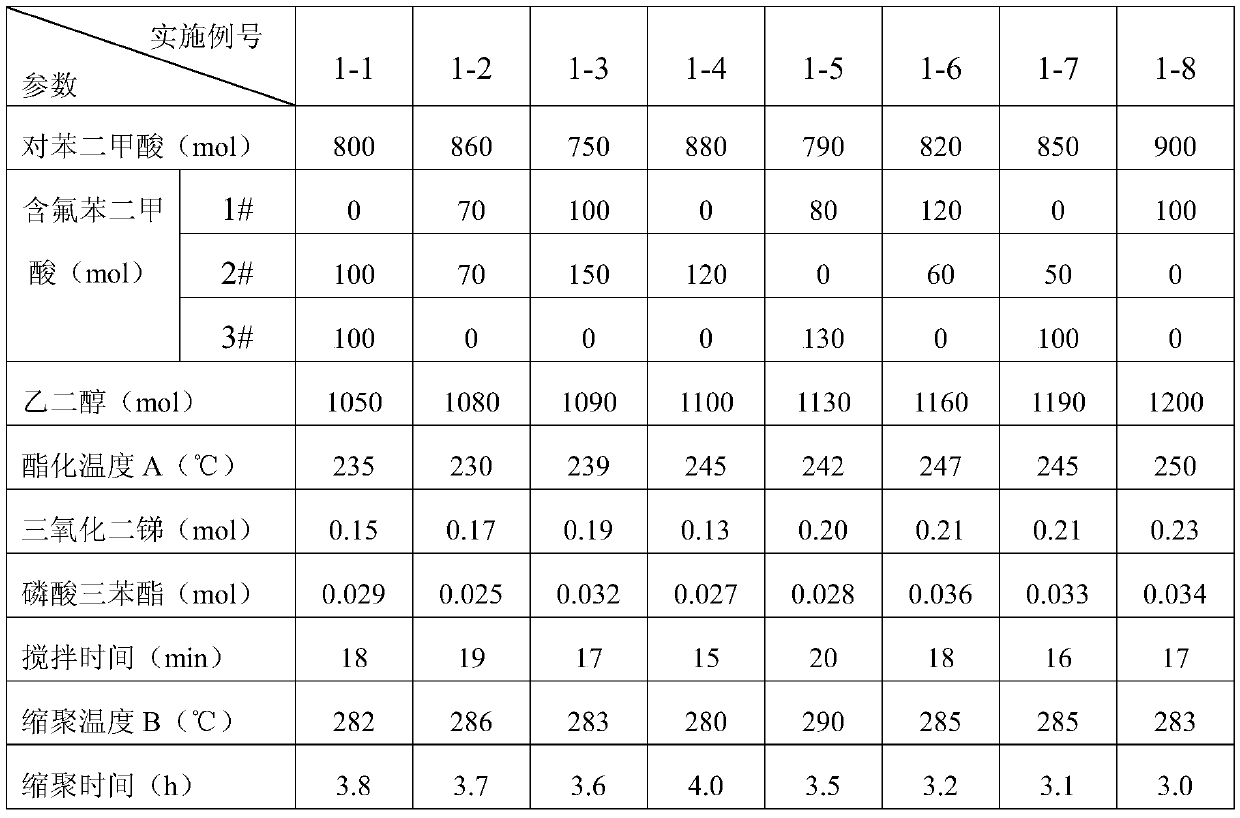Hydrolysis-resistant fluorine-containing copolyester resin, hydrolysis-resistant fluorine-containing copolyester composite basal membrane and preparation method thereof
A technology of hydrolysis-resistant and copolyester, which is applied in the manufacture of solar photovoltaic battery backplane materials, hydrolysis-resistant fluorine-containing copolyester resin, release film, hydrolysis-resistant fluorine-containing copolyester composite base film and its preparation fields, It can solve the problems of no improvement in hydrolysis resistance, easy film breakage, and large film shrinkage, and achieve the effects of improved hydrolysis resistance, simple preparation process, and good product performance
- Summary
- Abstract
- Description
- Claims
- Application Information
AI Technical Summary
Problems solved by technology
Method used
Image
Examples
preparation example Construction
[0035] Preparation of the first part hydrolysis-resistant fluorine-containing copolyester resin
[0036] Basic process and raw materials:
[0037] First, 1000mol of dibasic formic acid is prepared by molar ratio as terephthalic acid: fluorine-containing phthalic acid = 750-900: 100-250; then 1050mol-1200mol of ethylene glycol is prepared and added to the reactor together. The pressure is 0.2MPa. When the temperature in the reactor (temperature A) rises to 230°C-250°C, collect the water distilled from the esterification, and calculate the esterification rate based on the water output. When the esterification rate reaches 97%, start to (slowly) discharge pressure, add catalyst 0.13mol~0.23mol antimony trioxide, stabilizer 0.025mol~0.036mol triphenyl phosphate, stir for 15min~20min, then start (slowly) vacuum until the residual pressure in the reactor is less than 60Pa, and raise the temperature To 280 ℃ ~ 290 ℃ (temperature B) for polycondensation, polycondensation time 3h ~ 4h...
Embodiment 3
[0056] A hydrolysis-resistant fluorine-containing copolyester resin, the general molecular structure formula of the hydrolysis-resistant fluorine-containing copolyester resin is:
[0057]
[0058] In the formula: Among them: m is 60-90, n is 10-30, m, n, X and Y are all integers;
[0059] The intrinsic viscosity of the hydrolysis-resistant fluorine-containing copolyester resin is 0.60dl / g-0.68dl / g, the melting range is 240°C-252°C, and the molecular weight is 14000-25000;
[0060] The preparation method of the hydrolysis-resistant fluorine-containing copolyester resin is: add 1000mol dicarboxylic acid and 1050mol~1200mol ethylene glycol into the reactor, the initial pressure in the reactor is 0.2MPa, when the temperature in the reactor rises to 230℃~ At 250°C, collect the distilled water from esterification, and calculate the esterification rate based on the water output. When the esterification rate reaches 97%, start to (slowly) release the pressure, and add (catalyst) ...
Embodiment 4
[0064] A hydrolysis-resistant fluorine-containing copolyester composite base film, which is composed of a hydrolysis-resistant fluorine-containing copolyester film of the A layer (abbreviation: A layer) and a B layer of PET film (abbreviation: B layer). It is two layers of A / B, with a thickness of 100 μm. The mass ratio of the hydrolysis-resistant fluorine-containing copolyester film of the A layer to the B-layer PET film is 10:100. The hydrolysis resistance of the hydrolysis-resistant fluorine-containing copolyester composite base film It is: when the elongation at break is attenuated to 10% by cooking at 121°C, the cooking time reaches 60h~96h; under the test environment of 38°C and 90%RH, the water vapor transmission rate is 0.9g / m 2 ·24h~1.3g / m 2 24h range;
[0065] The preparation method of the hydrolysis-resistant fluorine-containing copolyester composite base film is: 10 parts by mass of the hydrolysis-resistant fluorine-containing copolyester resin for the A-layer hyd...
PUM
| Property | Measurement | Unit |
|---|---|---|
| Intrinsic viscosity | aaaaa | aaaaa |
| Melting range | aaaaa | aaaaa |
| Thickness | aaaaa | aaaaa |
Abstract
Description
Claims
Application Information
 Login to View More
Login to View More - R&D
- Intellectual Property
- Life Sciences
- Materials
- Tech Scout
- Unparalleled Data Quality
- Higher Quality Content
- 60% Fewer Hallucinations
Browse by: Latest US Patents, China's latest patents, Technical Efficacy Thesaurus, Application Domain, Technology Topic, Popular Technical Reports.
© 2025 PatSnap. All rights reserved.Legal|Privacy policy|Modern Slavery Act Transparency Statement|Sitemap|About US| Contact US: help@patsnap.com



